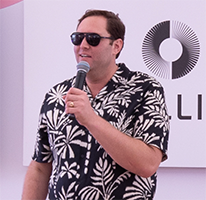I’M OLD ENOUGH to remember an ancient vaudeville joke. One guy says to the other, “What’s green, hangs on the wall and whistles?”
The other fellow ponders: “Uh…I dunno.”
“A red herring.”
“But it isn’t green.”
“So you can paint it green.”
“But it doesn’t hang on the wall.”
“So you can hang it on the wall.”
“But it doesn’t whistle.”
“So sue me.”
Our overstaffed and overstuffed legal troops are filing class-action suits for reasons far thinner than a bad joke, and a lot of them qualify as red herrings. “Legal ethics” is becoming an oxymoron. Anyone who sees the ads these lawyers are placing in mass media, inviting any and all to join the parade to the courthouse, simultaneously has to admire the chutzpah and cringe at it.
Consider the class-action suits against America Online. I know, I know, nobody loves AOL, including me. But who deserves this? Lawyers in Virginia, Arizona, Colorado, Ohio, Oregon and New Jersey filed separate class-action suits and are advertising them heavily. What’s the basis? They say AOL failed to inform users that its version 5.0 upgrade might interfere with their ability to connect to competing Internet service providers. I’m not kidding. That’s the rationale. The Virginia suit alone is asking for $8 billion. And – what a surprise – the same firm is handling four of the lawsuits.
There’s a parallel with all the class-action suits by cigarette smokers – uh, that is, by their lawyers. The upgrade to AOL 5.0 clearly asks whether the individual wants the latest version of the software; the invitation to smokers is accompanied by the surgeon general’s warning. Oh, I forgot: Nobody is responsible for his/her own actions. And although the Virginia law firm says it got “hundreds” of calls and e-mails from AOL users asking to join the suit, most people seem to have installed 5.0 and gone about their business.
The Arizona law firm ran two display ads in the same issue of a number of Sunday newspapers. They’re professionally produced ads, with similar reverse headlines beginning “Urgent news for…” One is for people who took Propulsid. It catalogs a laundry list of symptoms that seem to include everything except ingrown toenail. The other urgent news is for people who took Rezulin for diabetes and…well, let’s not get into that. The ads say “Open 7 Days a Week,” like a supermarket, and have a photo of an angry-looking eagle. Vulture might be a better symbol.
Then we have once-mighty Coca-Cola, whose recent griefs have been compounded by a discrimination suit filed by a bunch of former employees who also are militating for a Coke boycott. What’s the comeback against a discrimination suit? One reason companies settle is the reason these legal vultures know so well: Defending casts heat and light on the claim. And, of course, Johnnie Cochran tends to look for appearances.
Then we have the Franklin electronic organizer. Again in New Jersey, a law firm filed a class-action suit claiming the Rex PC Companion was defective because it “reorders the items to the user’s To-Do Call List in an apparent random fashion when an item is added, deleted or marked as completed (the `Alleged Defect’).” Aw, those poor puddy-tats. Anyway, Franklin denied this claim, but agreed to a settlement in which all the plaintiffs got an upgrade and the lawyers got a piddling $235,000. That they settled for such legal chicken feed may be an indication of the merit of this suit.
Even the AOL litigation isn’t as high profile as the Publishers Clearing House class-action suit. Assistant Attorney General Regina Cullen made a telling comment: “It’s important to look at the numbers and do the math. This is a $10 million settlement, but attorneys’ fees and other costs take away almost $6 million of that amount.”
Where does it end? A lawsuit against Loews and AMC theaters claims the theaters violate the federal disabilities law by – get this – failing to provide captioning for deaf people. One plaintiff said in all seriousness, “I can’t lip-read cartoons.” The suit asks the theaters to implement captioning for all movies.
The question hangs in the air: Whose responsibility is it, anyway? Should publishers be forced to print all books in large type? Should karate studios provide classes for paraplegics? Should restaurants have full-time first-aid attendants for those who choke on food they’ve swallowed improperly?
The cousin of the class-action suit is blaming the media for advertising they carry. Sanity prevailed last May when the Supreme Court ruled that the medium isn’t the message. Had the rulinggone any other way, every newspaper, magazine, broadcast station and ISP would have been held responsible for claims of irresponsibility against their advertisers. The case in point was filed on behalf of a teenager who claimed somebody posted vulgar messages on Prodigy in his name, so Prodigy owed him money. The Supreme Court said no, the medium and the message aren’t the same. Prodigy can’t possibly police every message. If it did, even more legal actions would result.
We’re used to lawsuits by those who spill hot coffee on themselves, smash their cars into abutments or fall in the lobby of an office building. The defense, “But thousands of others didn’t spill their coffee and didn’t smash their cars and didn’t fall,” may be logical but unappealing to the legal mind.
So we communicators now walk on eggs…and the eggs no longer are golden. Some who have walked before us have smashed eggs by blurring the fine line between puffery and impossible claim. Our job is to retain credibility while still being able to motivate the reader, viewer or listener.
Should legislation exist to protect consumer and business targets from being “had” by scoundrels? Oh, yes. Should marketers, their agencies and their consultants be held accountable for deliberate misrepresentation? Oh, yes. And should the courts look askance at lawyers who run their own ads, rounding up the dogies for a class-action cattle-call they know will result in riches for them and pennies, if anything, for their clients? Again, oh, yes.
We already have the strange and laughable situation in which tobacco companies legally advertise and are heavy users of direct marketing …while defending themselves with diminishing success against those who made the advertising successful. Joe Camel has gone to that great oasis in the sky. The memory lingers on: If you’re injured, insulted or sickened, go ahead and seek legal redress. But don’t invite the entire neighborhood to join in.
 Network
Network

